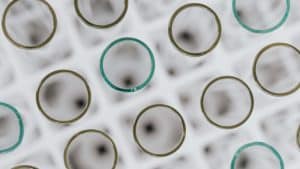Because the thyroid hormone regulates cellular function, abnormal thyroid function can affect your fertility. Undiagnosed and untreated thyroid disease can be a cause for infertility or recurrent miscarriage.
Hypothyroidism, an under active thyroid, is a frequent cause of infertility. If the thyroid in under active, the hypothalamus and pituitary gland can sense this and try to kick things back to normal by increasing levels of the hormones TRH (thyroid-releasing hormone) and TSH (thyroid-stimulating hormone) in your body. TRH, produced by the hypothalamus, prompts the pituitary to release TSH, which in turn stimulates the thyroid to do its job. However, TRH also prompts the pituitary to release more of the hormone prolactin, which can interfere with ovulation.
Low levels of thyroid hormone can also interfere with the rate at which your body metabolizes sex hormones, which can also cause ovulatory disorders.
Excess thyroid hormone — resulting either from an overactive thyroid gland or from taking too much thyroid hormone — can also cause problems. Thyroid hormone can block the effect of estrogen at various points in the body. That means the estrogen will not be as effective at getting its job done. This can make the endometrium (uterine lining) unstable and cause abnormal uterine bleeding.
Fertility clinics and ob-gyns often don't even include thyroid testing as part of a fertility testing and rarely include thyroid tests as part of a pre-conception examination. An interesting study published in the journal Thyroid reported that only 63% of the doctors are knowledgeable about the connection between thyroid and fertility. A higher percentage could be observed among endocrinologists followed by obstetrician-gynecologists.
How Do Thyroid Disorders Affect Pregnancy?
Undiagnosed and untreated thyroid problems can worsen your pregnancy symptoms such as fatigue, hair loss, depression, and morning sickness. Undiagnosed, untreated or insufficiently treated thyroid conditions can endanger your pregnancy, increasing the risk of miscarriage, intrauterine growth retardation, pre-term labor, stillbirth, and cognitive problems in your child.
One of the key concerns is getting enough thyroid hormone during pregnancy, and one study reported that a hypothyroid woman who becomes pregnant should increase her dose by 29%.
Research reported at the May 2005 Endocrine Society annual meeting summarized some of the key knowledge regarding hypothyroidism and pregnancy:
- Historically, hypothyroidism has been thought to interfere with fertility.
- Among women who were known to have thyroid deficiency, successful pregnancy was rarely reported during the first half of the 20th century, and miscarriage rates among such women were high.
- Even mild thyroid hormone deficiency in a mother may be harmful to the developing fetus. One study found if a mother has Free T4 levels that are less than the 10th percentile at 12 weeks gestation; the baby faces almost 6 times the risk to have impaired psychomotor development.
- We now know that overt hypothyroidism in a pregnant woman, particularly during the first trimester, is associated with intellectual impairment in the child.
- Another study found that women who had elevated TSH levels during the second trimester of pregnancy had significantly reduced IQ in their children at the age of 7 and up. According to James E. Haddow, MD, lead study author, the range below an 85 IQ level can mean significant impairment for children.
The increased need for thyroid hormone seen in early pregnancy can only be met by increased hormone production by the gland, which depends on there being enough iodine available in the diet. It is important to discuss with your doctor any concerns or issues you may have regarding your thyroid, fertility and pregnancy for both you and your child's health.
Resources:
Casey. B. "Maternal Hypothyroidism: Maternal Fetal Outcomes." Endocrine Society Annual Meeting, May 2005. [S7-2]
Glinoer, D. "Pregnancy the Thyroid: Importance of the Iodine Nutrition Status." Endocrine Society Annual Meeting, May 2005.[S7-3]


